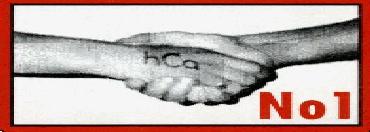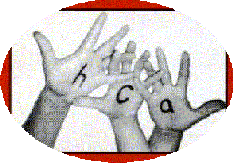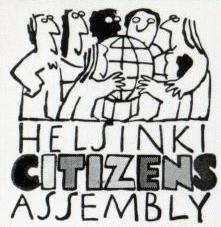hCa in General
The Helsinki citizens is an international network of civic initiatives, movements, social, political groups in the east and west, working for a democratic integration of Europe. hCa functions within the signatory countries of the final Document from the Conference on security an cooperation in Europe (Helsinki, 1975).
hCa’s main goal is to articulate and promote views, interests and political vision of civil society in the Helsinki region about European integration and the problems Europe is confronted with. Discussion about integration of and the problems in Europe cannot take place at a level of national governments alone: society has to be involved as well. hCa wants to widen the debate about Europe beyond the level of the political elite.
The international secretariat is established in Prague (Czech republic), and there is a western Liaison Office in The Hague (Netherlands). There are national branches of hCa in all countries in the Helsinki region.
Since hCa wants to create effective guarantees for freedom, democracy and respect of human rights in Europe, including the protection of all kinds of civic initiatives, special attention is paid to conflict regions. In particular, hCa supports courageous people who are struggling to keep civic virtues alive in situations of war, chaos and oppression. hCa has opened offices in Sarajevo, Tuzla and Banja Luka (BiH), Tbilisi (Georgia, Caucasus area. Plans for offices in Pristine (Kosovo) and Turkey are on the table.
 On 8th of April 1995, hCa officially opened it’s office in Tuzla. Since that time the hCa office in Tuzla has been actively involved in promoting, strengthening and linking civil initiatives in Tuzla and BiH. The hCa Tuzla office works closely together with the forum of Tuzla Citizens and various other local organizations.
On 8th of April 1995, hCa officially opened it’s office in Tuzla. Since that time the hCa office in Tuzla has been actively involved in promoting, strengthening and linking civil initiatives in Tuzla and BiH. The hCa Tuzla office works closely together with the forum of Tuzla Citizens and various other local organizations.
One of the main events hCa organized in BiH was the general Assembly in Tuzla in October 1995. hCa holds a general Assembly approximately every 18 month. It is an international gathering of about 1000 activists from all over the Europe, North America and beyond. A wide range of workshops and plenary sessions provide a forum to discuss hCa-policy, to assess hCa activities and to develop new projects. The topics of the workshops include humanitarian intervention, women’s issues, citizenship laws, civic economics, nonviolent conflict resolution, inter confessional dialogue, the role of the media in conflicts, etcetera.
From October 19th till 22nd 1995 the General Assembly was held in the city of Tuzla. Even though the war in Bosnia was at that time going on, 600 people from former Yugoslavia, Europe and North America came to Tuzla and participated at the assembly. These participants represented international organizations, national governments, municipalities and of course all kinds of civic initiatives. Aside from discussing the normal NGO topics, we focused on the role the international community and civic initiatives (both from BiH and abroad) can play in the solution of the conflict in Bosnia.
What is hCa in Tuzla doing??
The main tasks of the hCa office in Tuzla are:
1. The strengthening and linking of civic initiatives in different towns in BiH and abroad. hCa Tuzla has made contacts with various civic initiatives in BiH. hCa Tuzla aims to support and promote their activities, to get them in contact with other partners, to assist them in organizing themselves, etc.
2. Producing regular reports and articles about the perspectives of civil society, the work of various local, groups working on peace, human rights, democracy, independent media, culture, education, etc., and the political social and military situation in Tuzla and elsewhere. These reports are being send to various contact partners, civic initiatives, governments, European institutions, etc.
3. Serving and clearing a house, intermediary and promoter of projects in Tuzla. hCa Tuzla functions as a contact point and intermediary for a lot of organizations and persons (journalists, NGOs, municipalities, schools, hCa offices, politicians etc.) both in Tuzla and abroad. In practice this means identifying concrete projects in Tuzla that are in need of partners from abroad, and assisting counterparts from abroad by answering queries, facilitating communication with various local organizations, organizing delegations to Tuzla, etc. hCa Tuzla also gives technical assistance in the way that local groups can make use of the fax, computers and international telephonelines in the hCa Office.
4. Actively promoting international cooperation on reconstruction projects in Tuzla. hCa has for example been actively involved in the establishment of Dutch cities for Tuzla. This organization is a combined effort of local initiatives, NGOs, local government etc. in Tuzla and the Netherlands. By implementing nine integrated projects, Dutch cities for Tuzla aims to work on the welfare of Tuzla and it’s citizens.
If you have any question of suggestion please contact one of the staff members mentioned in the address list of this newsletter.
During the short interview we did with the only international member of the Tuzla team, Miriam Struyk, we get to know some more. At first there is a little unclearness about the name, There are many organizations that use the word Helsinki, Helsinki Watch, Helsinki Citizens Assembly, Human Right Watch, the are all look alike. “It all comes from the Helsinki statements about Human Rights, signed by many countries in 1975. All these organization work with these statements in the back of there head but they are independent. Luckily many of them cooperate with and inform each other.”
“hCa works together and share a building with the forum of Tuzla citizens. This has several reasons. This forum existed in 1993 when tension appeared between the citizens of Tuzla. A wide protest of the citizens of Tuzla against this form of extremism was the beginning of the Forum. At that time the founders of the forum could use some protections of international organizations. That is the roots of our cooperation.”
There are some critical questions asked about the fact that in Bosnia so many magazines are released, all donated by the international community, so is the magazine sponsored by hCa. “At first it is important that these activities happen, after that you can go and see on what way it could be done on the best way. I’ll give an example: Recently we organized a festival over here. It wasn’t a superb festival and it was not spectacular but all 20 cooperators , from different cities in Bosnia, had the idea it was their festival. That’s why the mess wasn’t too big, the atmosphere was really good, and the ideas for the future were even better. It is not about the product but about the process. The cooperation will lead to further fusion.”
Finally we asked if it was possible to add a few personal notes to this interview. That was possible. “I must adept myself. There are many foreigners who think that their (foreign) way of doing should be imported over here. But it has to be a process from two sides. There are also people who come here and spend 5000 DM to check out the situation and finally have 200 DM left for a project. You can’t piss them off because it are people of good will. But we like to see them using 200 DM on the fax machine and use 5000 DM for a project. I took a long time before I was used to the situation around me.”
“You know what is strange, we work on a project for refugees. It’s aim is to accompany those refugees that would like to return. We work with refugees in Tuzla from Bijeljina, and with refugees from Tuzla in Bijeljina, which is a town in RS. There are 10.000 people in Tuzla registered to go back and 4.000 in Bijeljina. If you speak with these people you notice that there has never been a problem between the people of these two cities. During the whole war they had no problems with each other. It where the authorities that made problems. That is the nationalism. And than you should know that there are constant problems between people from Tuzla and people from Sarajevo, which are on the same side of the front ....”
We thank Miriam very much for the explanation of the hCa activities and for the hospitality she offered us, before we’ll find ourselves in the complex Sarajevo situation again, with the promise we will come back soon to the city of Tuzla



